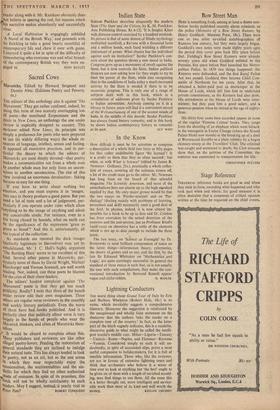. Bow Street Man HERE is somethin g fresh, among at
least a dozen non- fiction books, published recently about criminals or the police (Memoirs of a Bow Street Runner, by Henry Goddard : Museum Press, 18s.). There were one or two other so-called autobiographies of Runners last century, but they were largely bogus. Goddard's own notes were made eighty years ago; the period they cover goes back fifty years before that. Fielding's Bow Street Runners were already seventy years old when Goddard enlisted in the Patroles, five years before Peel launched the Metro- politan Police. In 1839 two things happened: the Runners were disbanded, and the first Rural Police Act was passed. Goddard then became Chief Con- stable of Northants for ten years. After that, he obtained a better-paid post as doorkeeper at the House of Lords, which left him free to undertake private commissions, as the Runners had also done. His attendances at the House of Lords were inter- mittent; but they paid him a good salary. and a generous pension when he retired at the age of eighty- three.
His thirty-four cases here recorded appear in none of the regular 'Famous Crimes' books. They range from the shooting of an elephant which went berserk in the menagerie in Exeter Change (where the Strand Palace Hotel now stands) or the breaking up of a duel at Wormwood Scrubbs to a plate robbery by a bogus chimney-sweep at the Travellers' Club. The criminal was caught and sentenced to death; the Club minutes show that, on the petition of the Committee, the sentence was commuted to transportation for life.
CHRISTOPHER PULLING


































 Previous page
Previous page